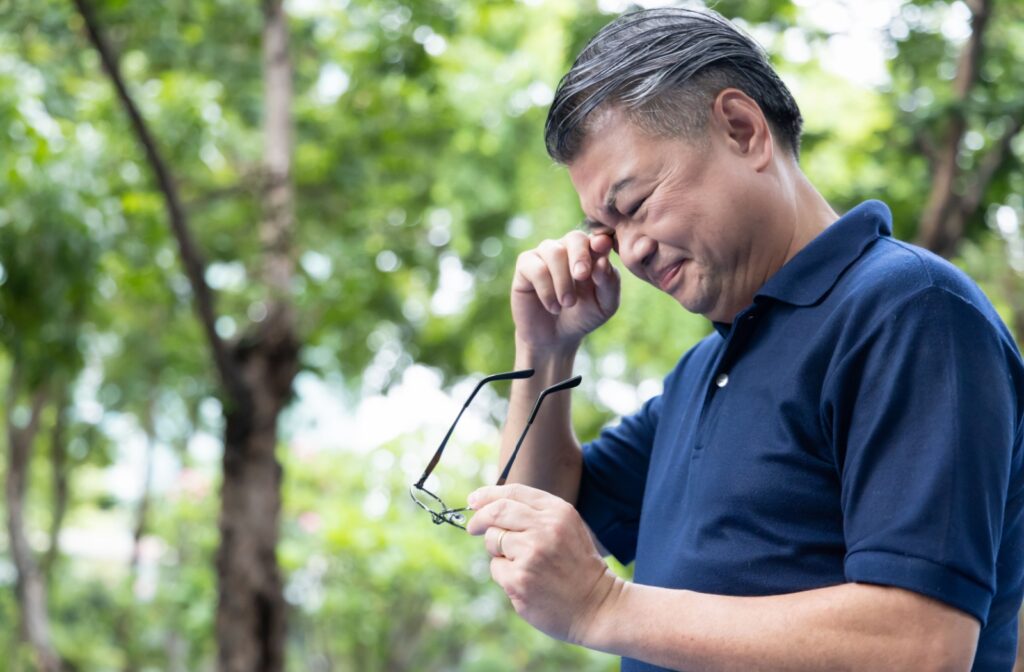Dealing with dry, irritated eyes can be exhausting, and noticing floaters drifting across your vision might add a layer of worry you weren’t prepared for. These small, shadowy shapes can be distracting and unsettling, leaving you to wonder if these 2 common eye issues could be related.
Dry eyes and floaters can both disrupt your vision, but dry eyes don’t cause floaters. These two conditions, while sometimes occurring simultaneously, are influenced by separate underlying factors that your optometrist can diagnose with an eye exam. Once you understand these factors, you’re on your way to making your vision clear and comfortable.
What Is Dry Eye Disease?
Dry eye disease occurs when your eyes don’t produce enough tears or the tears evaporate too quickly to provide adequate lubrication. It can be uncomfortable and, for some, affect daily activities like reading, working on a computer, and more.
Some of the common symptoms of dry eye include:
- Redness and irritation
- Burning or stinging sensations
- Blurred vision
- A gritty feeling in the eye
- Foreign body sensation
- Watery eyes (a response to irritation)
While dry eyes can affect anyone of any age, certain factors can make them more likely, including:
- Environmental factors like smoke, wind, and air conditioning
- Prolonged screen time, which can cause digital eye strain
- Medical conditions such as rheumatoid arthritis, diabetes, thyroid problems, and eyelid inflammation.
- Aging, as tear production naturally decreases over time.
- Medication side effects such as those from antihistamines, decongestants, blood pressure medicine, and antidepressants.
Additionally, women are more likely to develop dry eyes due to hormone changes.
What Are Floaters?
Floaters are tiny specks, lines, or cobweb-like shapes that drift across your field of vision. Although frustrating, they are usually harmless and part of the normal aging process. Floaters occur when microscopic collagen fibers within the vitreous gel inside the eye clump together, casting shadows on the retina.
Floaters are more likely if you:
- Have nearsightedness
- Recently had cataract surgery
- Have eye inflammation
- Suffer from migraines
While floaters are generally not concerning, sudden changes—such as new floaters, a significant increase in their number, or flashes of light—can indicate serious issues like retinal detachment. If you notice these symptoms, contact your eye doctor immediately.
Why Do People Think Can Dry Eyes Can Cause Floaters?
Although both dry eyes and floaters are common, particularly as we age, dry eyes and floaters are not linked. One explanation for the overlap between these conditions is age. Both dry eyes and floaters become more prevalent with aging. Dry eyes may develop due to reduced tear production or meibomian gland dysfunction, while the vitreous humor in the eye becomes less stable, leading to floaters.
How Optometrists Treat Dry Eye
Optometrists can use a variety of approaches to manage and treat dry eye. There is no single best treatment and any sort of management plan depends on the severity of the symptoms and the underlying causes. Common treatments include:
- Artificial tears: Over-the-counter or prescription options can restore moisture to the eyes for rapid relief.
- Prescription medications: Anti-inflammatory eye drops (e.g., cyclosporine or lifitegrast) can help reduce inflammation and improve tear production.
- Punctal plugs: An eye doctor can insert small, biocompatible devices into your tear ducts to help retain natural tears for longer.
- Warm compresses and lid hygiene: Keeping your eyelids clean can help alleviate symptoms caused by meibomian gland dysfunction (MGD).
- Nutritional supplements: Omega-3 fatty acid supplements may reduce inflammation and improve tear stability.
- Specialty contact lenses: Scleral or hybrid lenses are designed to protect the eye’s surface and can help keep your eyes hydrated all day.
IPL Treatment for Dry Eye
Intense Pulsed Light (IPL) therapy is an in-office treatment option originally used to treat fine lines and wrinkles but has gained popularity for managing dry eye caused by meibomian gland dysfunction. This non-invasive procedure uses pulses of light to reduce inflammation and stimulate the meibomian glands, encouraging the production of healthy oils in the tear film.
IPL can be particularly effective for patients who have not responded to conventional treatments and offers long-term relief with regular sessions. While you may see results after a single visit, it usually takes a series of treatments tailored to your individual needs for optimal results.
How to Treat & Manage Eye Floaters
While floaters are generally harmless, they can sometimes be distracting or indicative of an underlying condition. Managing them effectively begins with understanding their cause through a comprehensive eye exam.
For mild cases, no treatment may be necessary as floaters often become less noticeable over time. However, if floaters significantly impact vision or are accompanied by symptoms like flashes of light or a sudden increase in floaters, they may indicate a retinal tear or detachment.
If your floaters are severely impacting your vision, your optometrist may recommend treatment. This is usually a surgery called a vitrectomy where a doctor removes the vitreous, or laser therapy, where specialized lasers are used to break up larger floaters.
Clear Vision Starts Here
Dry eyes and floaters may present challenges in your everyday life, but understanding and managing these conditions is easier with support. While dry eyes don’t cause floaters, both should be carefully monitored to preserve your overall eye health.
If you’re experiencing persistent dry eyes or an increase in floaters, booking an appointment with our eye care team at Eyes on Plainville is a smart first step. We’re passionate about helping you see through to the other side of eye discomfort. Book your appointment today and take the first step toward clearer, more comfortable vision.





